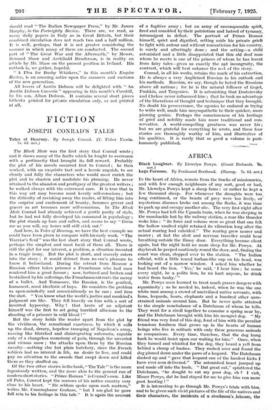FICTION
JOSEPH CONRAD'S TALES
The Black Mate was the first story that Conrad wrote ; and it shows many of the faults which he fought to overcome with a pertinacity that brought its full reward. Probably the plot of his novels occurred first to Conrad ; he then worked, with an exquisite tact and a heroic anguish. to see clearly and fully the characters who would most enrich the plot and to chasten and modulate his phrasing. He never attained to the abandon and profligacy of the greatest writers ; he walked always with the extremest care. It is true that in this way art may become most keenly self-conscious ; but the difficulty of ravishing away the reader, of lifting him into the surprise and excitement a beauty, becomes graver and graver as art becomes more self-conscious. In The Black Mate Conrad had already achieved a gentle purity of style, but he had not fully developed his command in psychology ; the plot stands up bare and sullen, and seems to say " Dress me as you will, my bones will still stick out."
And here, in Tales of Hearsay, we have the best example we could have been given to compare with his early work. "The Warrior's Soul" was the last short story that Conrad wrote, perhaps the simplest and most lucid of them all. There is still the plot for our interest, a problem, a situation invented in a tragic irony. But the plot is short, and scarcely enters into the story ; it would detract from no one's pleasure to know it beforehand. During the retreat from Moscow a Russian officer takes prisoner a Frenchman who had once rendered him a great favour ; now, tortured and broken and bestialized by his sufferings, the Frenchman entreats the mercy of a bullet. And Tomassov, the Russian, is the gentlest, humanest, most idealistic of boys. He considers the problem as open-mindedly and conscientiously as he can ; and fires the shot. "You know what the world's justice and mankind's judgment are like. They fell heavily on him with a sort of inverted hypocrisy. Why ! that brute of an adjutant himself was the first to set going horrified allusions to the shooting of a prisoner in cold blood ! "
But the story holds the reader apart from the plot by the vividness, the sensational exactness, by which it calls up the dead, dreary, hopeless tramping of Napoleon's army, moving like blotched and disintegrating automata, capable only of a changeless monotony of pairr, through the unvaried and vicious snow ; the attacks upon them by the Russian cavalry—nothing else but plain butchery, since the French soldiers had no interest in life, no desire to live, and could pay no attention to the swords that swept down and killed them as they shuffled on.
Of the two other stories in the book," The Tale" is the more ingeniously written, and the more akin to the general run of modern short stories. "Prince Roman" is Conrad's own. Like all Poles, Conrad kept the sorrows of his native country very close to his heart. "He seldom spoke upon such matters," writes Mr. Cunninghame Graham, "but I am glad he gave full rein to his feelings in this tale." It is again the account of a fugitive army ; but an army of unconquerable spirit, fired and ennobled by their patriotism and hatred of tyranny, intransigent in defeat. The portrait of Prince Roman himself, quiet and dignified, setting aside his private griefs to fight with ardour and without romanticism for his country, is surely and affectingly done ; and the setting—a child astonished and a little disappointed that this old deaf man whom he meets is one of the princes of whom he has learnt from fairy tales—gives us exactly the apt incongruity, the contrast, which will best enhance the rest of the story.
Conrad, in all his works, retains the mark of his extraction. He is always a very Anglicized Russian in his outlook and his methods. Russian, we say, though he hated the Russians above all nations ; for he is the natural follower of Gogol, Pushkin, and Turgeniev. It is astonishing that Dostoievsky and Chekov never influenced him ; that he took no advantage of the liberations of thought and technique that they brought. No doubt his perseverance, the agonies he endured in trying to write well, made him unsympathetic to their quicker, more piercing genius. Perhaps the consciousness of his heritage of grief and nobility made him more traditional and con- servative. A world-compelling greatness was never his ; but we are grateful for everything he wrote, and these four stories are thoroughly worthy of him, and illustrative of his qualities. It is rarely that so good a volume is post- humously published.










































 Previous page
Previous page